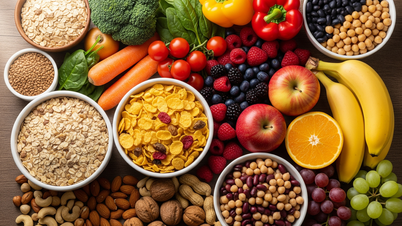 |
| With new research and advice, many people are asking how many eggs they should eat per day. (Photo: Hoang Hong) |
Recent analyses suggest that the appropriate amount of eggs to consume depends on age, health status, and personal goals such as weight loss or brain power. New data suggests that eating eggs in moderation may help older adults live longer, improve memory, and maintain healthy cholesterol levels. On the other hand, overconsumption may have the opposite effect.
Number of eggs to eat per day
Eggs are a nutritious food. A large egg contains about 6-7g of high-quality protein with essential amino acids, along with important vitamins such as A, D, E, B12 and minerals such as choline, selenium, lutein, zeaxanthin. The yolk is the part that provides most of the nutrients and good fats, especially beneficial for the brain and eyesight. The white is a pure source of protein, containing no cholesterol.
A recent study published in Food & Function that followed nearly 19,000 adults found that those who consumed an average of 1.5 eggs a day had significantly higher bone density than those who did not eat eggs. Specifically, bone density increased by 72% in the femur and 83% in the spine. This finding suggests that eggs are not only a source of protein but also support bone health, especially in people at risk of osteoporosis.
Supports weight control and metabolism
Eggs have a perfect protein biological index (100 points), help restore muscles and support metabolism. Breakfast with eggs helps reduce hunger, stabilize blood sugar and limit daily calorie intake, thereby supporting weight loss more effectively than a breakfast high in starch.
Enhance memory and brain function
Egg yolks are a rich source of choline, a nutrient needed for the formation of neurotransmitters and cell membranes. For pregnant women, choline supports fetal brain development. For older adults, choline helps improve memory and reduce the risk of Alzheimer's.
Eye protection
The yolk also contains lutein and zeaxanthin, two important antioxidants that are concentrated in the retina and help protect the eyes from blue light and oxidative damage. Eating eggs every day increases blood levels of these two substances by more than 100%, thereby reducing the risk of diseases such as macular degeneration and cataracts. Eggs are also rich in vitamin A, which is essential for vision.
Cardiovascular effects
Eggs have been misunderstood because they contain about 186-200 mg of cholesterol per egg. However, many studies have shown that dietary cholesterol has less of an impact on LDL ("bad") cholesterol levels than saturated fat. Most healthy people can eat up to 7 eggs per week without harming their heart health.
The US Food and Drug Administration (FDA) has now classified eggs as a “health food,” emphasizing their low saturated fat content and high nutrient density.
Source: https://baoquocte.vn/nen-an-bao-nhieu-qua-trung-moi-ngay-320711.html





![[Photo] Hanoi is ready to serve the occasion of the 80th National Day Celebration on September 2nd](https://vphoto.vietnam.vn/thumb/1200x675/vietnam/resource/IMAGE/2025/8/29/c838ac82931a4ab9ba58119b5e2c5ffe)































![[Photo] Prime Minister Pham Minh Chinh meets with Speaker of the New Zealand Parliament Gerry Brownlee](https://vphoto.vietnam.vn/thumb/1200x675/vietnam/resource/IMAGE/2025/8/28/cec2630220ec49efbb04030e664995db)































































Comment (0)